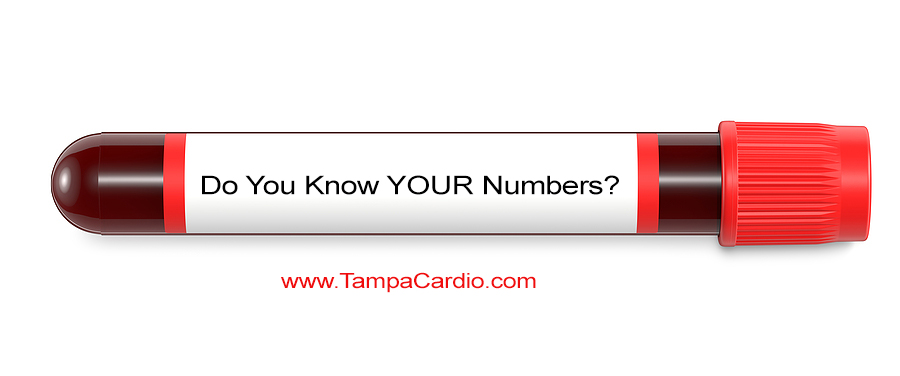Do You Know Your Numbers? – Your Health May Depend on It
Posted by: Tampa Cardio
On: June 1, 2021

Protect your heart and your body by getting blood work done as recommended by your physician.
According to the American Heart Association doctors agree there are some vital numbers you should know and watch for to keep your heart and your body healthy.
There are 4 lab range numbers that are very important to monitor regularly especially as we age.
- Blood Pressure
- Blood Sugar
- Body Mass Index (BMI) and Total Cholesterol
- LDL and HDL Cholesterol
Each number has a range in which it should fall to ensure you are protecting your heart.
Blood pressure – is the measured pressure your blood places on the walls of your blood vessels as it circulates it through the body. It is recorded like a fraction, one number over the other. The
Top number is systolic (pressure during a beat). The bottom number is diastolic (the pressure between beats).
You should have your blood pressure checked every year starting at age 18. If you have other risk factors, every 6 months becomes standard. 120/80 is considered perfect. Above that and it needs to be monitored.
Blood Sugar / Blood Glucose – This is the measurement of sugars carried to supply the cells with energy. It is a marker when too high for diabetes. This level needs to be taken while fasting. Overweight patients need to have their glucose checked every 3 years age regardless. Adults in a healthy weight range are checked every 3 years starting at age 45. This reading is important because type 2 diabetes is often a precursor to heart disease and other cardiovascular issues.
BMI (Body Mass Index) – Measures your weight relative to your height. A higher BMI means you are carrying excess weight and putting a strain on your heart. The ideal BMI range is 20 to 25. Those with a muscular physique could have an elevated BMI and in this case a waist measurement helps to determine actual risk. Women with a waist larger than 35” and men over 40” are at greater risk.
Cholesterol – LDL (Low Density Lipoprotein Cholesterol) is a waxy substance in your cells. The measurement should be less than 100mg/dL in a healthy individual. If you have heart disease it should be less than 70 mg/dL. Lower levels reduce risk of cardiovascular issues.
Cholesterol – HDL (High Density Lipoproteins) often called “good cholesterol”, higher levels are associated with less risk. HDL levels in men should be greater than 40 mg/dL and in women that number rises to 50 mg/dL or greater.
Triglycerides – are a form of fat found in the body. It is created when calories are not used right away. They store in fat cells and are used between meals for energy. Proper ranges for triglycerides come in at less than 150 mg/dL. A mildly elevated level is between 150 and 499 and over 500 is too high and requires medical treatment.
Initial screening for cholesterol and triglycerides should be between ages 17 and 21. If that initial screening is normal, you won’t be tested again till age 35 for men and 45 for women. If it is elevated, men should be tested again at 25 and women at 30.
How to keep your numbers in check
- Eat well – fruits, veges, lean meats.
- Avoid saturated fats and processed food.
- Avoid consuming excess carbohydrates.
- Maintain a healthy weight.
- Do not smoke.
- Do not drink excessively.
- Avoid street drugs and unnecessary medications.
What happens if you ignore your numbers?
The truth is you can get away with it for quite some time in many cases. You will feel just fine… until you don’t.
These ranges can get out of hand without you realizing it then suddenly you won’t feel well, will wonder why, and upon some blood work being done you will see damage may have been occurring right under your nose.
It is far easier to take a proactive approach to health than it is to try and repair it later. Monitoring and adjusting as you go is far easier and less costly than trying to undo damage done.
Obesity, hypertension, and diabetes are the three most common health conditions that develop without symptoms. There are hundreds of diseases that are spurred by these issues. Untreated they can lead to stroke, cancer, and even death.
Need your numbers checked?
Come see us at Tampa Cardiovascular Associates of Tampa Bay, Florida. www.tampacardio.com
813-975-2800.
Posted by: Tampa Cardio
On: 01/06/2021
